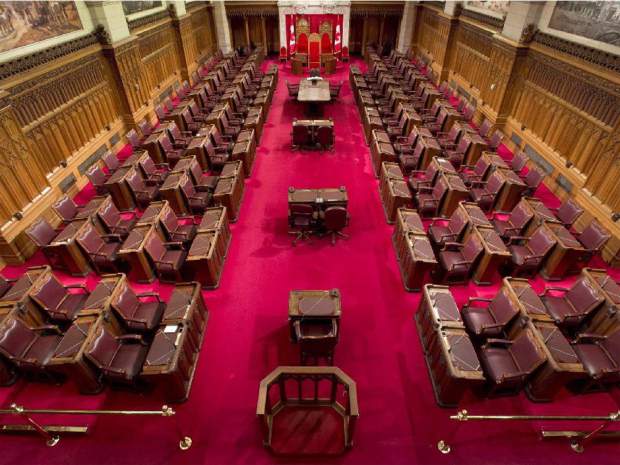Over the weekend, Government Leader in the Senate err, "government representative" Senator Peter Harder, gave an interview to CBC Radio's The House about the state of the Senate in advance of the final legislative sitting before the next election. To date, the Senate has amended about a quarter of the bills that have passed through it, leading Harder to assert that the government is "serene" and "accepting" of those amendments, and with the Senate still deferring to the elected Chamber, this is apparently the very model of "robust bicameralism." Harder's assertions miss a metric tonne of nuance that colours everything he asserts, and given there are definite storm clouds on the horizon, we should break down some of what is actually taking place.
To begin with, Harder's assertion completely ignores that the vast majority of those amendments that the government accepted actually came from the government usually after grievous drafting errors were pointed out to them, mind you, but very few adopted amendments were on the initiative of senators. In a very few instances, they came about because the Senate was digging in its heels Bill S-3 on amending the Indian Act to comply with a court order being the most obvious example, but even there, the Senate agreed to a compromise with the government that certainly didn't please everyone involved. This context is important because it means that for all of the government's talk about being willing to entertain Senate amendments, there has been very little uptake on it. Indeed, most of the time when the Senate sends bills back to the Commons with amendments, the House generally rejects them with no reasons other than they "respectfully disagree" with the Senate.
Harder's vision of "robust bicameralism" doesn't demonstrate any actual change in the way the Senate has operated. "The Senate is a revising chamber, not a defeating chamber," Harder asserted in the interview, though the Senate has defeated bills on several occasions in the past, and usually for good reason, such as a government overstepping its bounds. After all, the Senate has an absolute veto on all legislation with the exception of constitutional amendments in the constitution. It is by definition a defeating chamber when it needs to be. The fact that Senators are not elected means that they will usually defer to the Commons, and Harder has tried to dress this up in the language of a non-existent Salisbury Convention, but asserting that they are not a "defeating chamber" is both false and intellectually dishonest.
Harder went on to tout the supposed changes under the current composition as somehow making the Senate more legitimate, with language that made me cringe:
"I would think that the Senate conducts itself in a fashion that is deliberative and advances the agenda of the government in a fashion that brings credit to the Senate; we will have achieved a whole parliament where an independent, less partisan Senate that is advancing oversight and accountability, and that is acting as a truly complementary body to the House of Commons is one that Canadians can continue to expect."
There is a fundamental disconnect between the notions of oversight and accountability, and advancing the agenda of the government, but Harder has rolled them all together, probably because he has no idea what he's doing. And that's a problem.
Something else that I found particularly noteworthy was the fact that Harder said that he's received no pushback from the government around his "management" of the Senate, but this again is lacking in context. What this ignores is both the fact that the government by which I mean Cabinet has put on a big show of distancing itself from the Senate, which was more about Trudeau trying to wash his hands of any whiff of scandal emanating from the Senate during the Duffy/Wallin/Brazeau days, and this includes his appointment process, which again, was put in place to provide more distance in the public eye about who gets appointed never mind that he still makes the final determination. That he dressed it up in the language of "independence" or less partisanship was a convenient fiction the Senate has always enjoyed institutional independence, and has always been far less partisan than the House of Commons, even during those days when certain prime ministers tried to pull non-existent strings to exert undue influence upon it.
But this distance of Trudeau's has become a problem operationally. When it was announced that because of botched construction work on the new Senate chamber, the Senate would delay its return in the New Year by several weeks, officials from Treasury Board contacted Senate Communications about looking to make up lost time rather than contacting the person they should have Harder. You know, the Leader of the Government in the Senate. This is mind-boggling to think that it happened, and yet it did, because this government is deliberately creating a blind spot around anything where the Senate is created. I've heard tales about how staff in ministers' offices don't grasp that the Senate Liberals aren't under the direction of Harder, while others seem to assert that Harder is in charge of the Independent Senators, even though he's not (though Harder likes to assert that he's "non-affiliated" a falsehood that is predicated on the notion that he can somehow be half-pregnant, that he can both represent the government and yet not be aligned with them), and he occasionally likes to refer to the Independents as "his guys."
The Trudeau government's neglect when it comes to the Senate is hardly benign it's corrosive, and is undermining our parliamentary system in slow and subtle ways. Weakening the government and opposition dynamics in the Senate leaves it vulnerable to abuse by future governments (and possibly this one), and Trudeau is doing long-term damage to his own party's prospects in the Upper Chamber when they are no longer in power. That Harder and the Independents don't see this is a problem, and that journalists are ignorant about what is going on in the bigger picture is scandalous. Tinkering with our institutions should only happen with great thought and caution something that nobody is exhibiting here, and we will all suffer the consequences for it.








